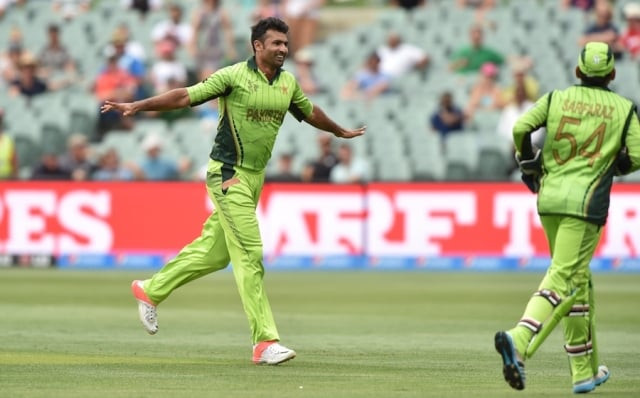And so ends a journey of defiance, in despair
Tired, exhausted and shorn of their best men, they took on a force far more superior

PHOTO: AFP
“Eat well, for tonight we dine in Hades,” said King Leonidas to his men, tired and surrounded, on the final day of the Battle of Thermopylae, knowing full well that it is the last time he will be leading his men into battle. Misbahul Haq would have said something similar to his players when they went in at lunch, defending just 214 in the quarter-final against the home team.
The men — foolish romantics and warriors — responded as the Spartans had all those years ago. Tired, exhausted and shorn of their best men, they took on a force far more superior and dared to challenge their air of invincibility. And for a fleeting moment, they made even those men, proud and sure, doubt themselves.
Muhammad Aamir, Muhammad Asif, Saeed Ajmal, Junaid Khan, Muhammad Irfan, Muhammad Hafeez, Umar Gul — Pakistan’s seven first-choice bowlers were missing. This bowling attack was not the contingency plan, it was the one born of desperation. But perhaps no one had told them that, for they refused to lie down.
An early wicket was followed by two quick ones in the middle by Wahab Riaz, who produced a six-over spell of fast-bowling as memorable and menacing as any in the 40-year history of the cricket World Cup.
With sheer pace, deadly accuracy and precocious bounce, Wahab showed how much of a difference a tall fast bowler could have made here. Someone, maybe, who was seven feet tall. Someone, maybe, who had been Pakistan’s strike bowler till just a week ago. Someone, who was forced to watch on helplessly from behind the boundary rope.
But still Pakistan had reduced Australia to 83-3 when Wahab got Shane Watson to edge his pull shot towards deep fine leg. Rahat Ali settled underneath it. He had played a single ODI before this World Cup. Suddenly he found himself in the most important moment of his career. He got in position to take the routine catch as 47,000 fans at the Adelaide Oval held their breath. 200 million watched back home, waiting to erupt, waiting to celebrate. He never did. They never did.
And Rahat Ali, 26 years old, has now been forever cursed to a life of ‘what ifs’. What if he had been placed anywhere else, what if he had taken it, what if Pakistan had won. What if, what if, what if. No man should live with such a burden, but Rahat will have to.
In typical fashion, when the opponent seemed in disarray, scrambling for cover, Pakistan shot themselves in the foot. They lost the match then, defeated by themselves.
Heads fell and morale went down. Luck, as harsh a mistress as any, was not on their side. Any team in the world would have been forgiven for giving up hope. Pakistan, however, did not. And when Ehsan Adil dismissed Steven Smith, Australia still needed 66, and back came Wahab. Tattered and wounded but suddenly with a ray of hope, Pakistan went for the jugular.
Another perfectly directed bouncer followed. Glenn Maxwell made a mess of it, edging it to third man. This time it was Sohail Khan. Similar experience, different man, similar outcome.
It proved to be one body blow too many — Pakistan were finally down and out. But for a moment, as fleeting as it was beautiful, they almost pulled off another South Africa.
They say fortune favours the brave but it does not — it favours the wise. And Pakistan, as brave as they are, are anything but wise. It was therefore fittingly unlucky that their campaign was defined by their weakest link — the catching. They dropped Virat Kohli in the first match and he made a century, then they dropped six West Indies players and lost by 150 runs. Then Hamilton Masakadza skied one up for Zimbabwe and Misbah settled under it. The ball was in the air for so long and the pressure was so high that the skipper visibly aged when he did finally take that catch, but it meant Pakistan won. It was followed by Hashim Amla’s catch by Sarfraz Ahmed in the South Africa match that changed the game.
For Pakistan, it was a tournament of ups and downs — a tournament defined by catches taken and dropped, a cruel tournament, an unfair tournament. And now, a finished tournament.
The defeat will inevitably be analysed and dissected to the bone. The batsmen will surely be criticised for their role, especially those who got starts but then threw away their wickets, again in a manner befitting of foolish warriors — mad men doing the same thing again and again but expecting different results.
In the end, it will go down as a six-wicket win for Australia but looking at statistics can produce strange results. It was never as simple as a six-wicket win.
Now it is the end of the line for two of Pakistan’s greatest-ever players — Misbah and Shahid Afridi — one of them will go down as one of its finest batsmen, the other as one of its finest all-rounders. But they leave behind a team used to such huge losses, used to tackling one problem after the other, used to defying the odds so much that they cannot function in any other situation.
Pakistan go out but they can go out proud. They lost but they lost to themselves. It was failure, but it was glorious failure — as damning as it was heroic.
Misbah and Afridi can walk off into the sunset as proud men. Goodbye, and thanks for the memories.
Published in The Express Tribune, March 21st, 2015.



















COMMENTS
Comments are moderated and generally will be posted if they are on-topic and not abusive.
For more information, please see our Comments FAQ